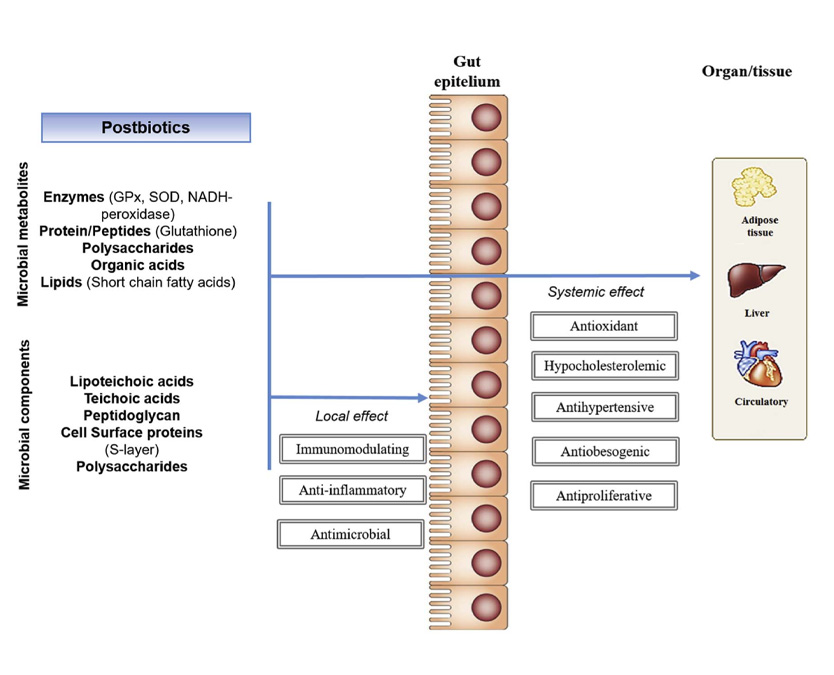Gut bacteria depend fully on their host to provide the necessary nutrients that may promote microbiota growth. However, bacteria produce small molecular weight metabolites during their lifecycle; these compounds play a key role in regulating self-growth, development, reproduction, encourage the growth of other beneficial organism, cell to cell communication and protection against stress factors. Some of these soluble metabolites may be secreted by live bacteria, or released after bacteria lysis, into the host environment, offering additional physiological benefits by modifying cellular processes and metabolic pathways in the host.
The term Postbiotic, also known as either metabiotics, biogenics, or simply metabolites/CFS (cell-free supernatants), refers to soluble factors (products or metabolic byproducts) secreted by live bacteria or released after bacterial lysis. These byproducts offer physiological benefits to the host by providing additional bioactivity. Such soluble factors have been collected from several bacteria strains; examples include short chain fatty acids (SCFAs), enzymes, peptides, teichoic acids, peptidoglycan-derived muropeptides, endo and exopolysaccharides, cell surface proteins, vitamins, plasmalogens, and organic acids.
The fact that the mechanisms implicated in the health beneficial effects of Postbiotics are not fully elucidated, scientific data have provided evidence that Postbiotics possess different functional properties including, but not limited to, antimicrobial, antioxidant, and immunomodulatory. These properties can positively affect the microbiota homeostasis and/or the host metabolic and signaling pathways, thus affecting specific physiological, immunological and metabolic reactions.
In general Postbiotics possess several attractive properties such as clear chemical structures, safety dose parameters, and longer shelf life (up to 5 years, when used as ingredient for foods and beverages or as nutritional supplements) that are greatly sought out. In addition, some researchers revealed that Postbiotics have favorable absorption, metabolism, distribution, and excretion abilities, which could indicate a high capacity to signal different organs and tissues in the host thus eliciting several biological responses. Moreover, it has been demonstrated that Postbiotics improve the health effects compared to probiotics while avoiding the necessary administration of live microorganisms, which may not always be harmless as demonstrated in many studies. Furthermore, theoretical concern associated with live probiotic bacteria administration (e.g., bloating and flatulence, probiotic-related translocation and bacteremia and fungemia, and possible transfer of antibiotic resistance gene) have been described in case reports, clinical trials and experimental models, in patients with major (e.g., immunosuppression, premature infants) and minor (e.g., impairment of the intestinal epithelial barrier, concurrent administration with broad-spectrum antibiotics to which the probiotic is resistant) risk factors for adverse events. Hence, the use of Postbiotics may represent a valid and safer alternative to avoids risk linked to live probiotic bacteria. Bioactive properties discovered in Postbiotics suggest that these compounds may contribute in the improvement of host health by providing better specific physiological effects.
It has been suggested that the immunomodulatory and anti-inflammatory capacities of Postbiotics are mediated by the inhibition and induction of the immune systems in various animal models. It has been found that Postbiotics regulate the production of the cytokine response and Th1 pathway inhibition. The antimicrobial activity of Postbiotics may be attributed to the presence of several known and unknown antimicrobial compounds, usually including but not limited to bacteriocins, enzymes, small molecules, and organic acids, which exhibit bacteriostatic or bactericidal properties against both gram-positive and gram-negative microorganisms.
All these properties suggest that Postbiotics may contribute to the improvement of the host’s health status by providing better and specific physiological effects, although the exact mechanisms remain to be elucidated. Definitely Postbiotics may be useful as microbial-free food supplements, fermented functional foods, and prophylactic drugs, as complementary treatment for several immunological diseases. Postbiotics are totally safe; they can be administered to newborns and some data demonstrate the Postbiotics can be formulated in a eye drop to treat VKC and dry eye.
Postbiotics research represents an opportunity not only to understand their mechanisms of action in detail but also to develop new therapeutic strategies for health improvement.
Text and image re-adapted from “ Postbiotics: An evolving term within the functional foods field “

